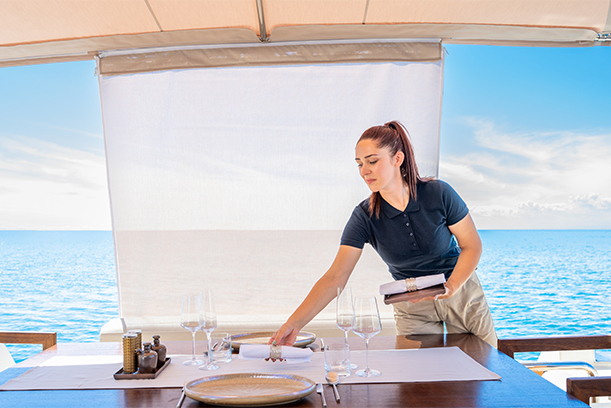
It's hard to believe that it has been over 30 years since we first introduced health benefits for crew members in the marine industry. At that time, we had to work hard to convince the industry that captains and crew members deserved access to the same type of health insurance benefits enjoyed by shoreside employees.
Today, crew have come to expect benefits as part of their compensation package. With so many more health insurance plans for crew on the market, deciding the best plan for your group can be difficult, but it doesn’t have to be daunting. We’re here to help!
Here are essential points to consider when selecting a Yacht Crew insurance plan for your group.
The Benefits
What coverage will you need?
First, it's important to figure out what you’re trying to achieve. Are you looking for a comprehensive plan or a plan offering basic coverage? Are you addressing attraction and retention concerns or protecting the owner’s liability and financial interests? The answer could play a significant role in the plan you select.
Assess the limits of each plan
Once you have identified a few group plans to review, carefully assess the coverage and limits. You'll want a plan that works alongside your boat’s P&I coverage and envelops medical expenses, such as hospital stays, emergency medical treatment, surgeries, emergency medical evacuation, mental health and well-being, and prescription medications.
It's crucial to ensure repatriation is also included in the policy should a crew member need to be returned to their home country in case of severe illness, injury, or death.
Check if the policy covers pre-existing conditions and the terms associated with pre-existing. Pay attention to the importance of wellness benefits such as annual checkups, preventative care, vision, and dental. If wellness benefits are not included as standard, consider adding these valuable benefits to demonstrate your care for the health and well-being of your crew.
Lastly, given the active lifestyle of crew members, the policy must include adventure sports coverage, either as a standard feature or as an optional add-on. The plan's overall price shouldn’t be the deciding factor, but budgets definitely need to be part of the consideration process.
Geographical Coverage
The boat’s itinerary is also important when arranging insurance for your group. Crew health insurance policies often have geographical limits that can restrict coverage. For example, if the boat splits its time between the Med, the Bahamas and the Caribbean, you should still consider getting US coverage. If an emergency occurs and an evacuation is necessary, there is a good chance that the crew member will be evacuated to the US. If US cover isn’t included in the policy, either the owner or the P&I, or both, could be responsible for the crew member’s medical expenses and their repatriation back home.
Flag and Crew Nationalities
Remember that the flag and the nationality of the crew can affect the choice of insurance plan. For example, if the boat is US-flagged, you may need a health plan that is based in the US because the boat is considered a US entity. In addition, UK insurance companies do not always offer health insurance options for boats with EU flags. Regarding crew nationalities, some insurance providers do not offer coverage to US citizens or residents. In contrast, others may only provide coverage if there is a low percentage of Americans or US residents.
Selecting the best insurance coverage for you can be confusing, but MHG will help you understand each of your options.
P&I Insurance
The boat's P&I insurance may significantly impact the Crew Health plan you choose. P&I often encourages, and in some cases warrants, that there is a Crew Health plan to provide coverage before the P&I coverage kicks in. Additionally, with high P&I deductibles, selecting a comprehensive Crew Health plan is important. Choosing a more comprehensive plan can help protect the owner from costly compensation disputes that may arise from a crew member's injury onboard.
Charter Yacht vs Private
When determining crew health insurance obligations, whether the boat is used for private use or charters makes a difference. If the boat is used for charters, it is most likely subject to the requirements of MLC. This places responsibilities on the owner in terms of liabilities to the crew. For instance, a charter yacht owner may be required to cover pre-existing conditions, whether insured or not. Additionally, they may need to provide a minimum of 16 weeks' wage cover in the event a crew member suffers a disability, as well as cover the cost of repatriation for almost any reason.
Finding The Right Insurance Partner
Insurance may be complicated, but partnering with the right insurance broker can make all the difference. At MHG, we’re known for our Crew Health expertise and high level of service, which are shown through our 5-star Google Reviews and reviews on Yachting Pages.
We work with the industry’s leading crew health insurance providers to bring you the best solution for your group. We’re not attached to one crew health plan and have options no matter whether you’re based in the Caribbean or Med. We understand the complexities of yacht crew insurance and will simplify the process for you. Learn more about our world-class marine crew offerings at www.mhginsurance.com/Insurance/Marine-Crew-Insurance.
Once the plan is in place, we’ll be here to answer questions about the coverage and assist with claims. Navigating insurance can be challenging, but with the proper guidance, you can ensure a smooth voyage for you and your crew.
Discover the ideal Yacht Crew Benefits Plan! Tailored insurance solutions should fit every crew member. Explore your options today!